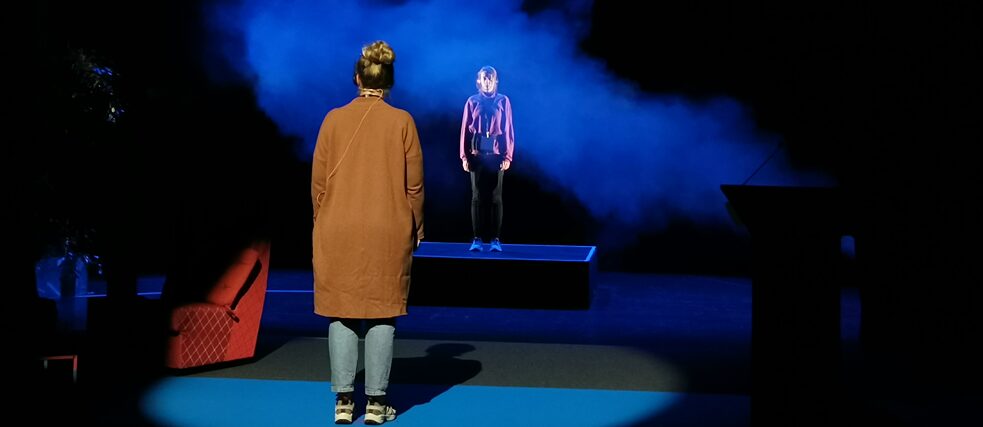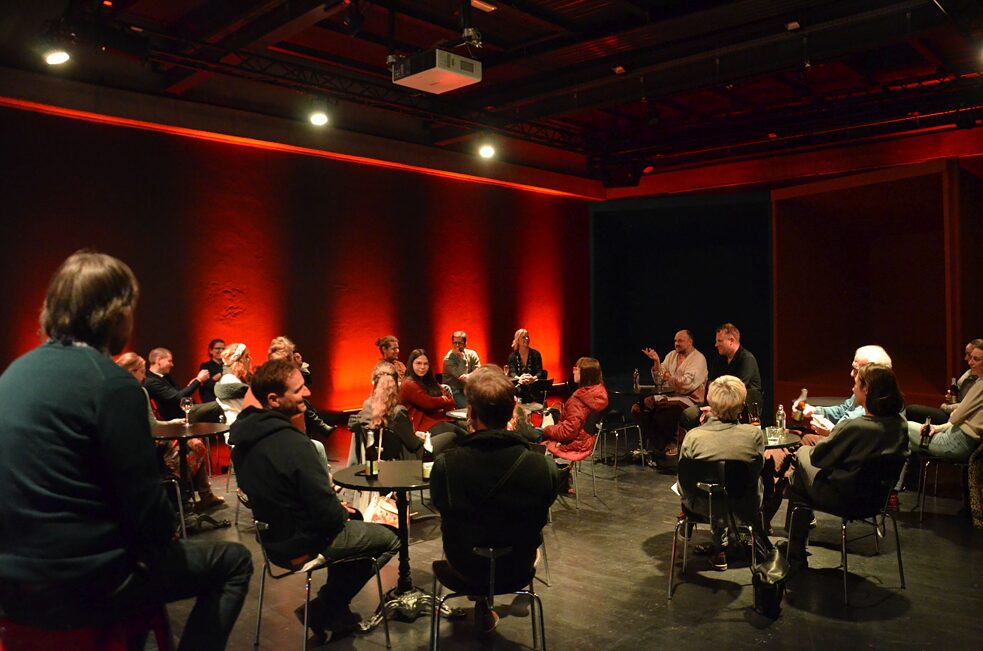Rimini Protokoll
Theatre as contact with reality

Helgard Haug, Daniel Wetzel and Stefan Kaegi have worked together in theatre for more than 20 years under the name Rimini Protokoll. Their work has been called "post-dramatic theatre", "new documentary theatre" and "expert theatre". This is because Rimini Protokoll productions never involve actors reciting parts by rote from a literary theatre play. Rather, they focus on people who tell the audience about their lives. Experts, in other words, on their own lives.
By Johannes Birgfeld
The theatre of Rimini Protokolls could be described even more simply: Helgard Haug, Daniel Wetzel and Stefan Kaegi use the theatre to bring their audience into contact with reality. "The stories themselves", as they put it, "don't need to be invented. The point is to select and frame them, to focus and connect them so the audience can illuminate them with their own hermeneutic microscope."[1] Rimini Protokoll don‘t invent stories, they look for stories that change our view of reality, that enrich and question it. At which point they invite people to tell their own stories, to address others directly.
Experiments in theatrical and political representation
From the very start, the work of Rimini Protokoll has insistently asked a question always central to the theatre: who represents whom here? Who gets to be on stage? What kind of stories are given a forum on the stage? Rimini Protokoll took this question beyond the theatre itself: in 2002, just a few years after the Bundestag moved from Bonn to Berlin, they staged the play "Deutschland 2" in the former capital city. In this production the audience weren‘t given the option of simply sitting back and listening: instead, they all became actors. From 9AM until late in the evening, a Berlin Bundestag session was broadcast live to Bonn. Politicians‘ speeches were transmitted to headphones worn by onstage „representatives“ who repeated the words aloud, as close to simultaneously as possible. Thus the audience were not just turned into actors, they also became the representatives of their own supposed political representatives at the Bundestag. The population absent from the Berlin Bundestag – where speakers in their name represent them – took the stage for a single day in Bonn to represent themselves, briefly incarnating others who normally count as their representation and incarnation.„Conference of the Absent“, 2021, or: new questions of presence and absence
Since their earliest work together, Rimini Protokoll have never ceased to raise and reformulate the question of political, social and theatrical representation. In 2019 they started thinking about a play that would be centred around experts who – as was clear from the outset – would not appear in the performances. "Conference of the Absent" is the result. After the German-language premiere in Dresden, the Institut Pierre Werner, the Goethe-Instituts and the Théâtre National du Luxembourg jointly organised a performance in Luxembourg, the first time the production was staged on consecutive days in two different languages, German and French. The second staging was also the French-language premiere.The Luxembourg audience proved willing to help stage the production, in the absence of either actors or experts. Only the audience and the Théâtre National du Luxembourg technicians (supported behind the scenes by Daniel Wetzel of Rimini Protokoll) were present, along with set design guidelines and the texts from the invited experts, recorded on audio tape in German translation. Those texts would only be spoken at all if someone in the audience would come onstage and recite them. To put it another way: if no-one had been willing to offer their own voice and body to another person‘s experience, if no-one had been prepared to raise their own voice for another, to represent them physically, there would have been no theatre performance that evening. But what could be more thrilling, more exhilarating, than to exchange your own life and body for another's, to lend a voice to somebody in need of one? Audience members at the TNL quickly declared their willingness to take on the first roles as they arose. If there was any hesitation at all, the voice of the moderator on the tape and the candy awaiting on the stage enticed even waverers to contribute to the collective theatre experience.
Pandemic life and climate care
Rimini Protokoll conceived "Conference of the Absent" in response to the climate crisis. Could theatre be brought closer to CO2-neutrality than is currently the case? Soon afterwards came the Corona pandemic. So "Conference of the Absent" came to portray multiple dimensions of the experience of absence. A play that works out differently every night, always successfully. In each staging different audience members take on the same part and interpret it in new ways. The text heard by the performers in headphones is spoken differently by each one: some are clearer, others more timid, more dramatic, more hesitant or more determined. Nor are the audience-participants the only ones to gain when they become the voice of another, allowing that person‘s story to be heard. The Rimini Protokoll collective sends reports to the experts, who - thanks to the messages and photos received - may briefly experience the loan of a healthy body or a voice in Europe, even when trapped on the continental periphery and long since unable to believe in anything of this kind._____________________
[1] Rimini Protokoll: ABCD. Saarbrücker Poetikdozentur für Dramatik. With an afterword and edited by Johannes Birgfeld. Berlin: Theater der Zeit Verlag 2012, S. 10.


Comments
Comment